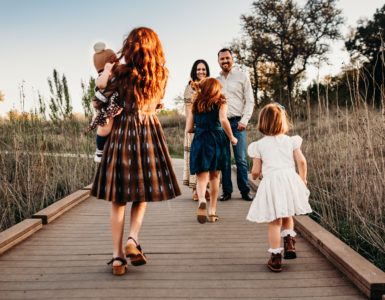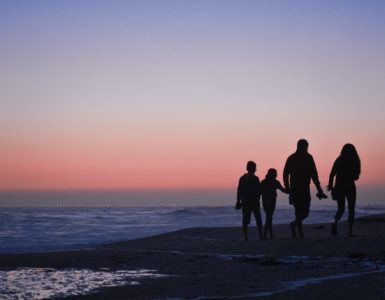JK Rowling introduced the world to the character of Harry Potter. Harry Potter, through his complex beginning, is the chosen child of the wizarding world. He spends 11 years of his adolescence fighting the dark world led by Lord Voldemort–a dark wizard who wants to take over the world, live forever, and rule over wizards and Muggles (non-magical people). When I started reading Harry Potter in 2001, I was struck by the masterful way that Rowling educates the reader in the thoughts, feelings, and pictures of the orphan’s journey through society. Millions of people have made the connection between Harry Potter and how his identity as an orphan shaped his evolution into finding his identity and his magical forever family.
I reached out on social media to ask for the expertise of Harry Potter fans. I found myself being in awe of what Rowling gave to the world when she introduced us to Harry. She showed us what it feels like to be an orphan and to navigate through a world that is not built for orphans. Regardless of the world that heis facing, Harry is able to sort through his own struggles in identity and grief with the loss of his parents and finds love through his own family structure. Love is possible, even with the loss of family.
Who is Harry Potter?
Harry is raised in the muggle world despite his parents being wizards. Unfortunately, Harry is an orphan. His biological parents, Lily and James Potter, were part of a special magical society that sought to fight against Lord Voldemort and his army. His parents died in battle when Harry was a baby. Harry is placed with extended family members, The Dursleys. They raise Harry in the non-magical world. They treat Harry as someone who is earning his keep and not a son On his 13th birthday, his world changes with the knock on the door. He is taken away from the muggle world by Hagrid and is sent to a school of magic called Hogwarts School of Witchcraft and Wizardry. Going to Hogwarts introduced Harry to a cast of characters that led him to a world filled with love, respect, identity, and family. Harry is shown a world that contains his birthright: his magical identity. The reader is sent on this journey with Harry to find his culture, find his non-biological family, and defeat the dark world. At the end of the series, Harry is no longer an orphan, but among a family that gives him the love and respect that is given to one in a family.
Harry Finds Family
The connection of people through love and respect is how Harry gains a close-knit circle of family and friends. In this movie, we see the foundation of Harry finding his own family with his friendships with Hermione Granger and Ron Weasley. Harry’s loyalty to Ron is shown straight away in two different scenes. The first is on the Hogwarts Express when the food trolley comes by and the other in one of the first scenes at Hogwarts when he meets Draco Malfroy and Draco tries to convince him to befriend him. Harry says the classic line, “I think I can tell the wrong sort for myself, thanks.” His fate to a house where he finds more family is his. It is expected that Harrywould go to Slytherin, but he prefers to go to Gryffindor withRon and Hermione. He even celebrates his first Christmas with Ron and received presents from the Weasley family as well.
Harry’s owl and Dobby are also introduced In Harry Potter and the Chamber of Secrets. This is where we see him spending more time with the Weasleys and less from the Dursleys. The Weasleys help him escape from the Dursley’s house to go to Hogwarts. Harry refers to Hogwarts as his home. Despite the family’s desire to see Harry with him and away from magic, Harry wants to go with the Weasleys. Rachel Patek adds that “while Ron is slightly embarrassed by his large, sometimes chaotic family, Harry is always amazed by them.” I believe that Harry is amazed by them because he knows that they come from a place of love.
From the Weasley family, his family grows to have more mother and father figures through the Order of the Phoenix. This order was the very same order his parents were in. As far as father figures, Harry gains Sirius Black (Harry’s parents’ best friend), Professor Dumbledore, Hagrid (friend of Harry, keeper of the ground at Hogwarts, later a teacher at Hogwarts), and Mr. Weasley (Ron’s father). Mrs. Weasley (Ron’s mother) becomes the constant mother figure in Harry’s life.
The Orphan Theme
Harry reveals the realities of being an orphan. There are issues of not knowing how to love and connect with others through identity, the feeling of taking on the world alone, and no sense of purpose. The orphan theme is masterfully woven in the story through various characters, not just Harry. While Harry is on this journey to find himself and to save the world from darkness, he finds others that are like him. They are walking through the same struggles and issues by not having biological parents as they try to find themselves.
Harry Potter as an Orphan
Harry Potter shows the abuse that can happen in adoption through his experience with the Dursleys. While discussing the topic with my friend, Sara Wells, she felt like the Dursleys “treated Henry like garbage, relegating him to the room under the stairs and denying him a chance to flourish in the magical world.” I believe she draws this conclusion from the fact that when Harry was left on their doorstep, they knew that Harry was a wizard. Wells guesses that maybe the “anti-Magic stance may have been rooted in genuine grief over the loss of Lilly,” but she is correct in comparing this experience to adoption. The adopted family tries to deny or hide the birth culture of the child. It leaves the child as Harry did, feeling confused and left out of the family. Thankfully, the confusion of identity does not have to end in the feeling of loss.
I’ve learned that my students who are orphans tend to want to work independently. It takes them time to want to connect with other children to work on a project together. We see this independent nature with Harry. Melissa Patek speaks about Harry’s nature to want to do things alone. This could stem from his dad being a hero, but I think it stems from him typically doing things by himself. She adds that an example is that Harry “wants to go to the Ministry of Magic alone in book 5 and he plans to look for Horcruxes alone at the end of book 6.”
Neville Longbottom—Harry’s Friend at Hogwarts
A couple of people pointed out to me that Harry’s friend Neville, a pure-blood wizard, was, in a sense, an orphan as well. His parents were respected in the magic world, just as Harry’s parents were respected, but they were tortured into insanity by some people in Lord Voldemort’s army when Neville was 16 months old. In the story, Neville’s parents were placed in the Janus Thickey Ward at St. Mungo’s Hospital for Magical Maladies and Injuries leaving Neville to be raised by his grandmother, Augusta Longbottom. It is through Neville that the reader is able to see the story of a foster child. As a teacher, I see everyday that there are children that have parents that are unfit, for various reasons, to take care of them; thus, they are placed in foster homes. These children typically visit their parents on the weekend or have days of visitation and then they go back into homes that are temporary or permanent. Despite these circumstances, I find that my students still long and love their parents, just as Neville loves his parents. Melissa Patek adds that, “Even though his mother, Alice, doesn’t recognize him, she often gives him wrappers when he visits St. Mungo’s.” This is similar to situations where parents are not capable of raising their children, but they do the best that they can to show their love in their circumstances. After the end of the Second Wizarding War, Neville briefly served as an Auror just like his parents. Eventually, he joins the staff at Hogwarts as the professor of Herbology. He marries and remains close to the friends that he met at Hogwarts.
Tom Riddle or Lord Voldemort or He Who Must Not Be Named—Harry’s Antagonist
The reader finds out in book 6 that Harry’santagonist was indeed an orphan as well. In fact, Lord Voldemort was raised in an orphanage. Tom Marvolo Riddle is a half-blood wizard considered to have been the most powerful and dangerous Dark Wizard of all time. He was the only child and son of Tom and Merope Riddle and was raised in an orphanage run by muggles (or non-magic people). His father abandoned his new family on the streets of London and his mother died moments after giving birth to him. The orphanage took care of Tom without knowing his magical heritage. The staff at the orphanage rarely gave him parental guidance mainly because of his independent nature. While independence does seem to be a positive in some cases, children always need love and parental guidance. Even if the child shows all of the independence, deep down there is still that desire for parental affection.
Tom has no sentimental attachments for the orphanage. At the orphanage, he would constantly terrorise his fellow orphans due to his uniqueness compared to them and found it hard to bond with the rest of the orphans. Harry was treated the same way, and it is interesting to note that Harry never terrorized his friends, but it is believed that it is because Harry’s parents poured love into him so early into his life. “Tom Riddle lived in an orphanage his whole life and because of various circumstances was never adopted and was never really shown the love and attention that children need. Both Harry and Tom grew up as orphans and lived in a place where they were not appreciated and misunderstood, but they turned out so differently,” said Melissa Patek.
Professor Dumbledore comes to get Riddle from the orphanage and he goes to Hogwarts. Despite Dumbledore’s attempts to connect with Riddle, Riddleonly sees him as competition, not as a parental figure or someone he could respect. He never connects with Dumbledore as Harry and Neville did. Just like Harry, Riddle goes home every summer until he tries to find a way out of it. While his mother did give him the gift of naming him before she died, he could never reconcile the torment between being mixed blood and identifying evil with being a muggle because of his upbringing. In fact, he returns to his muggle father and kills him and his grandparents and then goes on to frame his uncle.
Voldemort never learns love. He never loves another person. His followers follow him out of fear and not out of mutual respect. Voldermort never actually married. Bellatrix LeStrange loves him out of obsession and she gives him a child before they die because he wanted an heir, not a family. While Voldemont and Harry have similar backgrounds growing up, they become very different. Harry connects with people through love and mutual respect while Voldemort connects through fear and the misuse of power.
Family is Possible
In the end of the series, Harry marries Ginny Weasley (sister of Ron) and becomes an official part of the Weasley family. Even though Harry lost his biological family and suffered in his home with his aunt, he created his family just from connection through love, trust, and respect. When I think of Harry, I think of my own son. While my son is only 4, he left what he knew to come with us to create his own friendships and make his own connections. This is what happens every day with children who come in and from care experience. In the case of Lord Voldemort, the result was constant pain and struggle. The hope is that the result will be Harry’s experience. A life surrounded by people who love, respect, and hope: a forever family.




